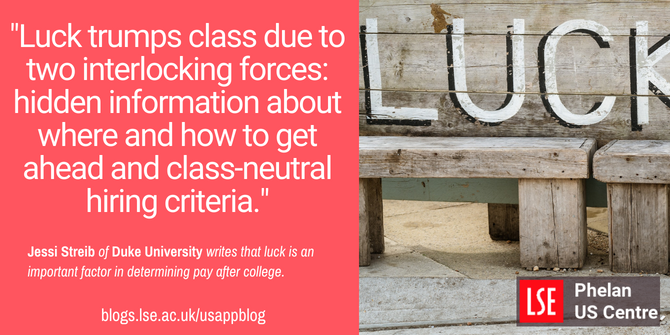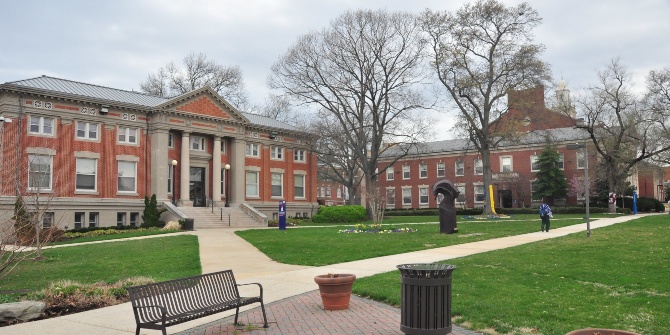 What determines how much people are paid in the jobs they find after college? Summarizing findings from her new book, The Accidental Equalizer: How Luck Determines Pay After College, Jessi Streib writes that class neutral hiring criteria, and the often-hidden nature of job information – including pay – for students entering some labor markets, nullifies many of class-advantaged students’ advantages. Through these effects, pay after college is often down to luck, meaning that those from unequal class backgrounds often earn the same average amount as the class-advantaged.
What determines how much people are paid in the jobs they find after college? Summarizing findings from her new book, The Accidental Equalizer: How Luck Determines Pay After College, Jessi Streib writes that class neutral hiring criteria, and the often-hidden nature of job information – including pay – for students entering some labor markets, nullifies many of class-advantaged students’ advantages. Through these effects, pay after college is often down to luck, meaning that those from unequal class backgrounds often earn the same average amount as the class-advantaged.
Students from different class backgrounds have unequal chances of graduating from college. But among those who graduate from the same college, students from different class backgrounds receive equal pay. How does this happen?
It’s not because college equalizes the resources related to finding jobs. Even among students at the same college, those from more advantaged class backgrounds have more professional connections, complete more internships, know more about the professional labor force, and often have higher GPAs.
Based on interviews with hiring agents and college seniors, I find that for students entering some labor markets, those from unequal class backgrounds earn the same average amount because earnings are allocated by luck.
How luck trumps class in post-college pay
Luck trumps class due to two interlocking forces: hidden information about where and how to get ahead and class-neutral hiring criteria.
In many labor markets, wage information is hidden from students of all classes. On university and national job boards, most job ads do not include pay. Websites like Glassdoor or Payscale offer some pay information, but this information can’t be relied on. And workers often don’t know their colleagues’ wages, so students with connections also have trouble learning what any job pays. And, even when students receive a job offer and learn that job’s pay, they still do not know how the pay they were offered compares to the pay they could receive for doing similar work at other firms.
Hidden job information and class neutrality
Information about how to find jobs is also hidden from students. Employers advertise that they are looking for candidates with particular skill sets, for example, strong communication and teamwork skills. But they rarely tell students what they mean by these skills, and different hiring agents mean different things. For example, among those looking for strong communication skills, one hiring agent may be looking for candidates who speak concisely and others for candidates who give long and detailed answers. Moreover, hiring agents regularly change their criteria and find new ways of evaluating whether students meet it, and they don’t share the detailed and changing ways they evaluate candidates with students.

Photo by Nick Fewings on Unsplash
Employers also use class-neutral hiring criteria in some labor markets, especially those for non-elite jobs. Some set a low hiring bar and do not care how high students jump over. For instance, some hiring teams look for candidates with at least a 3.0 GPA but don’t favor candidates with 4.0s over 3.0s. Employers also look for candidates with specific skills, but many don’t care where students acquire them, whether from leading an expensive and exclusive skiing team or working at McDonald’s. Some want students with internship experience, but many employers are more interested in what students accomplished during their internship than whether it was with a prestigious firm, and some see work experience as substitutable for internship experience. These criteria are class neutral as students from all classes can jump over low bars, and because employers ignore the status symbols that more advantaged students have an easier time obtaining.
Hidden information and class-neutral criteria then combine to level the playing field for students from different classes. When information about where and how to get ahead is hidden, students from all class backgrounds must guess where and how to get ahead. And when employers use class-neutral criteria, their guesses are equally likely to pay off.
Moreover, hidden information and class-neutral hiring criteria nullify many of class-advantaged students’ resources. While class-advantaged students have more family money with which to acquire skills, they can’t know what skills they need to gain to obtain any job. While class-advantaged students’ connections can get them some interviews, their connections rarely know how students will be evaluated, so they are just as likely to prepare students for questions that aren’t asked as ones that are or to feed them answers that are evaluated negatively rather than positively. And while some class-advantaged students’ connections can get them a job directly, hidden wages mean that their connections are just as likely to usher them into low-paying positions as high-paying ones. In a labor market with hidden information, everyone is guessing how to get ahead—students and their connections alike.
Not all labor markets have hidden wages, hidden hiring criteria, and class-neutral selection criteria, so only some labor markets allocate wages by luck rather than class. Those that do are often large labor markets with high wage variation and that hire for non-elite jobs, such as labor markets for non-elite business, engineering, science, and nursing jobs.
Equal earnings or career control?
As these types of labor markets are not ubiquitous, we must decide whether to expand or contract them. The decision isn’t easy, as earnings equality and transparency are at odds. Students from different class backgrounds receive the same pay because the people with the most money and best connections don’t know which jobs pay the most or how to obtain them; if they knew, it’s likely that they would find ways to monopolize these jobs. But keeping pay and hiring criteria hidden have their own costs; students from all classes cannot take control of their careers without this information. And so, we must decide what we want more: a chance at equal earnings for students who grew up in unequal classes, or a chance to feel more in control of our careers.
- This article is a summary of the author’s new book, The Accidental Equalizer: How Luck Determines Pay After College.
- Please read our comments policy before commenting.
- Note: This article gives the views of the author, and not the position of USAPP – American Politics and Policy, nor the London School of Economics.
- Shortened URL for this post: https://bit.ly/476km1q






Post-college pay is often down to luck, not class.
It’s time for transparency and fairness in job opportunities!